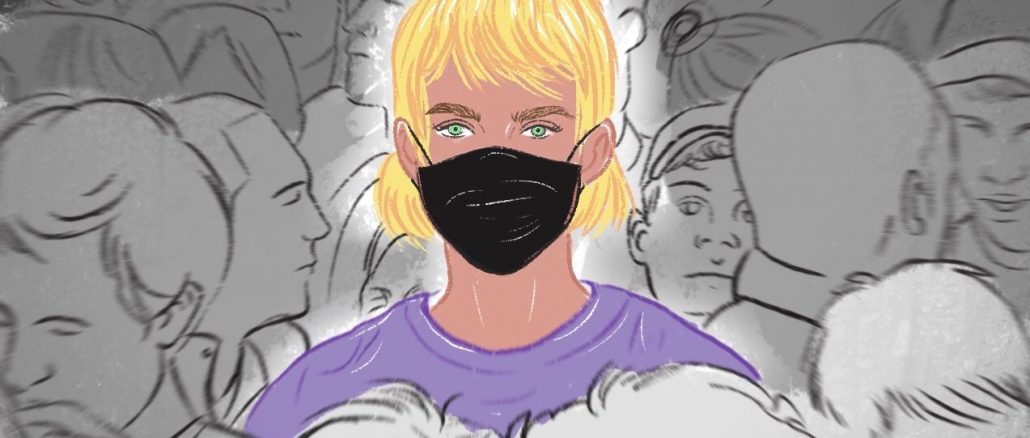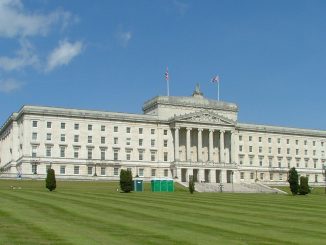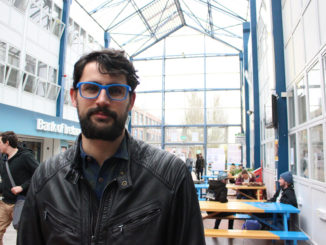
“Everyone’s starting to realise gender is a sham,” says Shan [they/them], a first-year arts student in NUIG.
Shan is Non-Binary. Their gender identity does not fall exclusively into the typical gender binary of male or female.
They came out in October, on National Coming Out Day in the middle of a worldwide pandemic. This affected their sense of self, and how they explore their identity.
“A lot of people are kind of joking about so many coming out during lockdown, but I think it’s because people don’t have to go out constantly and put on this mask every day,” says Shan.
“They present how they want to and mess around. You saw everyone chopping off their hair and messing around with makeup and stuff like that, and then being like ‘oh shit, I really f**k with this’.”
The relief of being able to express themselves came with some worries; not wanting to appear “visibly non-binary”.
“It’s scary because if I look anyway like visibly queer, I’m putting myself in a dangerous position,” says Shan.
“Ireland isn’t as progressive as people like to like to think it is, maybe not violently homophobic. But people would be like, “who the f**k is that?” Suddenly I have people talking about me. I don’t want them to.”
They mentioned the benefits of having a strong support network, and how friends can be greater sources of comfort than family.
“All my friends are people who have lots of queer people in their life to begin with. And they’re very accepting, even if they themselves aren’t queer,” said Shan.
“My family think of it like those bathroom signs that say ‘Girl, Boy, Other’. I’m not an other. I’m human.”
“Wanting something for yourself”
“I think I express a lot through music” says Leon Bird Morgan [they/them], a third year DCU student.
“I can sing and shout and scream punk stuff and not feel anything dysphoric about it,” said Leon.
They currently study music, while also recording music solo and with their band. Lockdown has been a time of reflection for Leon, allowing them to focus on their gender identity.
For them, being Non-Binary is an extension of Transgender identity: identifying as a gender different from the one assigned at birth.
Song-writing and performing allows Leon to focus on exploring their gender in a safe environment with other creators. The pandemic hasn’t made this easy for them.
“Screaming, shouting and singing in certain ways has kind of a neutrality to it that I like to hit, or even a more feminine side,” says Leon.
“I really want to be able to perform and express my identity just how I see myself in my room, in the presence of my friends.”
A recent survey from the Musicians and Entertainers Association Ireland (MEAI) revealed that 20 per cent of respondents had to seek mental health services, due to personal and financial detachment from live music gigs.
In an 2019 report, LGTBQI+ charity BelongTo revealed that young LGBTI+ people were 4 times more likely to suffer from extreme stress, anxiety or depression.
Music wasn’t always a comfortable outlet for Leon, who’s been singing since before being out as non-binary.
“I got dysphoric because I thought externally people would see me as the whiny emo trope,” says Leon about being vulnerable in their songwriting.
“The feeling of selfishness comes from the Irish idea of thinking you are selfish for wanting something for yourself.”
“I feel valid when I feel like I go to someone I can trust. I trust my mom a lot. She would treat me as a person.”
“If it took hours, I would Sit there for hours”
“I’ve gotten to the stage now where if, especially if I’m wearing a mask, a lot of people are unsure about my gender identity and honestly, that’s the goal,” says Lily O’Connor [they/them], a recent graduate from NUI Galway.
Lily is Transgender and Non-Binary.
They started hormone therapy during lockdown, crowdfunding their medical costs online. Due to complications from the HSE, Lily opted to go with the private clinic GenderGP in the north to assist with their transition.
For them, it was worth it to avoid notorious waiting lists, referral misplacements amongst other issues.
“I was on my Erasmus in Liverpool, so I was completely alone for the first three months of being out. That was really hard.” says Lily. Although friends promptly reached out online with support, acceptance from family came slowly when they arrived home.
“My sister was quite good, but the rest of them come from the kind of older, Catholic, conservative backgrounds,” says Lily.
“I’m a fairly patient person; If it took hours, I would sit there for hours and explain being trans. There are a lot of people who won’t do that. And I don’t blame them because it can be really frustrating.”
They say that every trans person they know can distinguish between total bigotry, and ignorance but willing to learn.
In addition to the crowd funding, Lily talks about the pandemic unemployment payment being a crucial factor in being able to pay medical bills. €350 a week is the most they’ve ever made.
Medical transition is available to Transgender people to help alleviate gender dysphoria: a psychological condition associated with discomfort or distress related to the gender assigned at birth.
There are different types of dysphoria: body, social, mind. Not all trans people feel the need to transition medically, and not all trans people are in the position to transition due to financial issues, unaccepting environments or internalised transphobia.
One of Lily’s favourite ways of expressing themselves is through clothing and feeling comfortable in their style.
“I dress quite alternatively and now and now I have so many more options,” says Lily.
“I have my overalls. I have like my big fancy coats. I have my bomber jackets… I have more than one pair of shoes for the first time in my life.”
Ireland’s Gender Recognition Act allowed trans people the ability to get legal recognition of their gender, but there are some limitations. Non-binary and intersex identities are not accounted for.
Whether it be through medical procedures, artistic expression, pronouns, name changes or strong support networks, Trans and Non-Binary people such as Lily, Leon and Shan need these to feel human, to be recognised and noticed.
For many it can feel like a second adolescence, finally being able to express their gender not on society’s terms, but their own.
Lily mentioned one of their fondest memories was being approached by a student in a class after coming out. Their degree included archaeology, which, ironically, has a lot of mature students.
“This guy, a 55-year-old ex-taxi driver came up to me, and without a word, shook my hand and said:”
“Welcome to the world, Lily”.
If you feel like you are in an emergency situation, contact the Samaritans on 116 123, or Pieta House on 1800 247 247
Transgender Equality Network Ireland (TENI) helps connect people with Trans and Non-Binary support groups such as Dublin Trans Peer Support Group, Gender Rebels Cork, Trans Waterford and many others. For further details, visit https://www.teni.ie/supports/
Zoe Thornes
Image Credit:



